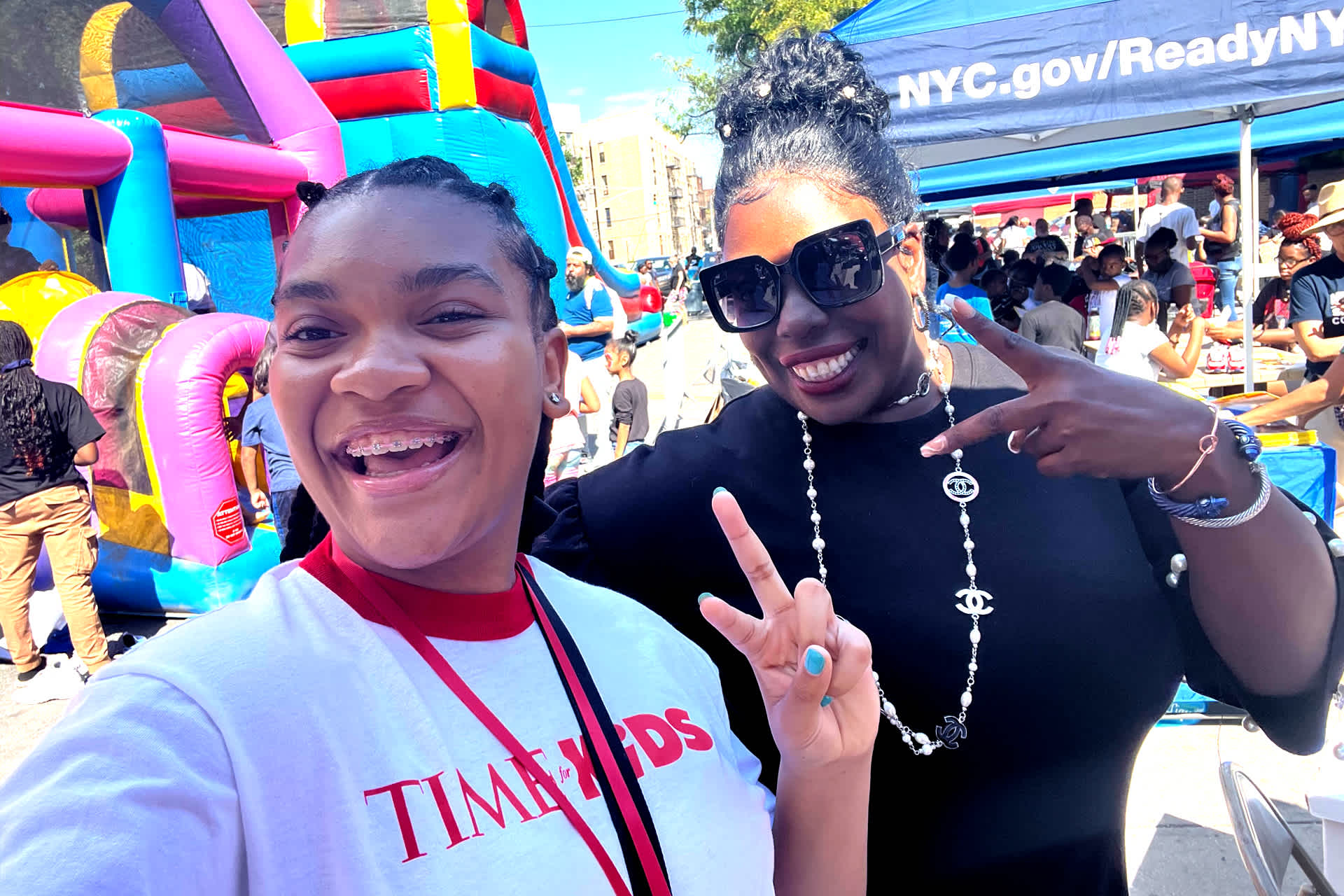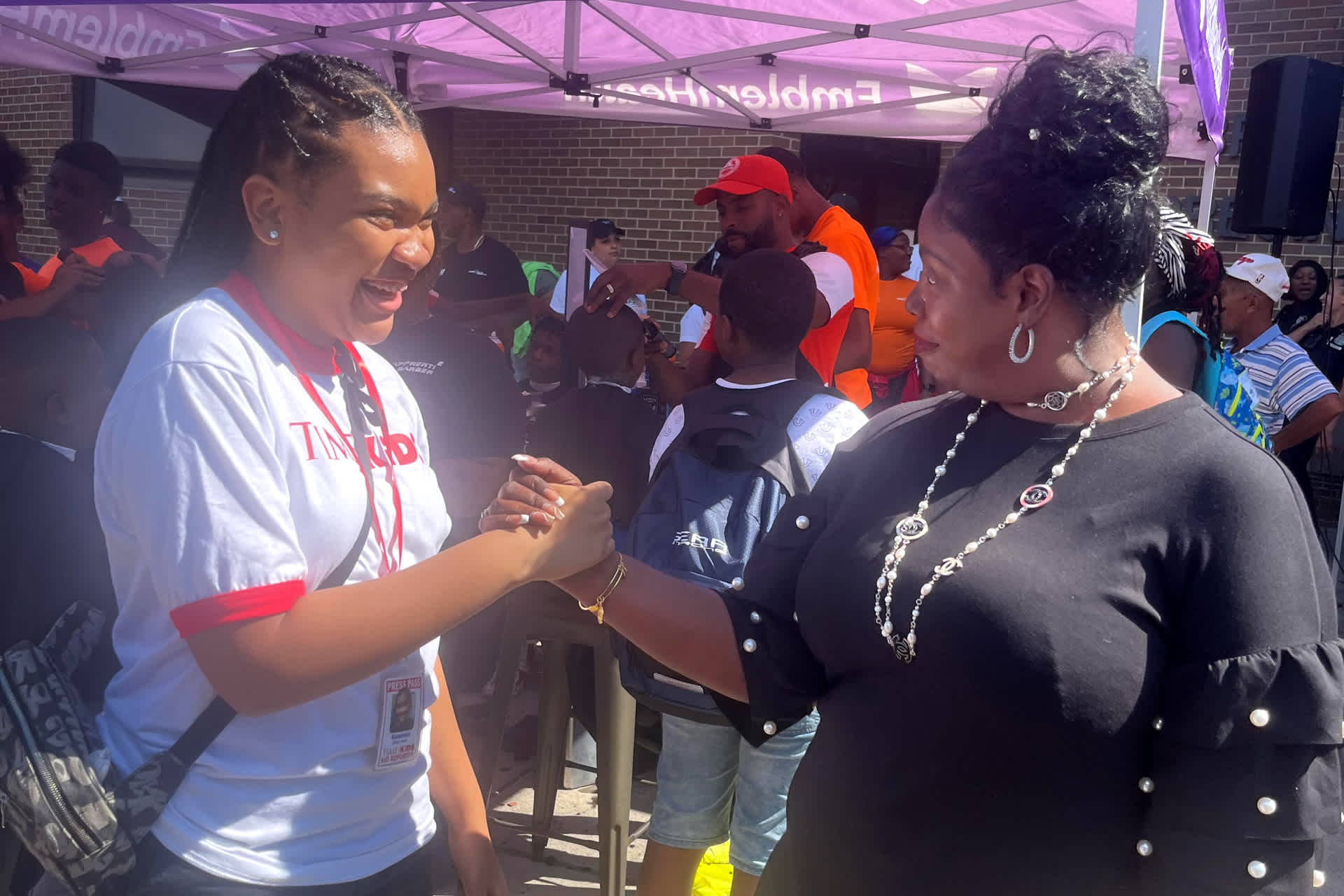Real Talk with Latrice Walker

Samirah Horton, also known as DJ Annie Red, is a TFK Kid Reporter. She was named a 2021 TIME Kid of the Year finalist for her work making music that takes an antibullying stance. Here, she presents a conversation with her local assembly member, New York State representative Latrice Walker.
Lately, I’ve been thinking about a career in law or politics. I’m learning that leadership at the local level is as important, even more important, than leadership at the national level. The community where I live, in Brooklyn, New York, is affected by our local leadership.
This fall, I was able to talk with my local assemblywoman, Latrice Walker, at a community event in Brooklyn. There were games, and back-to-school supplies were given away to children. It was a pleasure speaking with Walker and learning about her job. You can read part of our interview below.

TFK Kid Reporter Samirah Horton:
Can you recall that moment when you decided you wanted to be in politics or government?
Latrice Walker:
I went to SUNY Purchase to study acting, thinking I would one day see my name in lights. That didn’t work out. So then I set out to become an entertainment lawyer. I went to law school at Pace University, while working full-time, so I could help my mom with the bills. I eventually became an entertainment lawyer. I worked with Michael Jackson, Stevie Wonder, Lil’ Kim, Ciara, and Prince, my favorite artist of all time. [But] I grew tired of the entertainment scene.
I worked, beginning in 2007, as counsel to Congresswoman Yvette Clarke, focusing on issues such as criminal justice and affordable housing. I was also her liaison to the communities of Brownsville and Crown Heights [in Brooklyn]. In the midst of that work, back in 2014, the assembly seat in my district opened up. I had so many people calling me, telling me I should run. It was one of the best decisions I ever made.
I got to work even before I was sworn in on January 1, 2015, in Albany [the capital of New York]. It was one of the proudest moments of my professional career. My mother was there. My daughter was there. And several people from my community came to Albany to witness it.
Samirah:
What exactly does an assembly member do?
Walker:
The legislative branch of government in New York is made up of two groups: the New York State Assembly and the New York State Senate. As a member of the Assembly, I work with members of the Senate to create proposals for the state budget. The process often includes spirited negotiation, based on the needs of each district. Each spring, the proposals are debated and tweaked until the final budget is voted upon and adopted.
Part of my job involves introducing bills to improve the lives of New Yorkers. The bills can be related to a number of issues, including voting rights, criminal justice, housing, climate, healthcare, education, transportation. Really, almost anything you can think of.
The legislative session, where bills and budgets are debated and voted upon, generally runs from January until early April. During those months, I’m in Albany for several days each week. At the same time, I maintain a district office in Brownsville. My staff in that office responds daily to constituent concerns. They arrange or attend events throughout the year, including speaking engagements, backpack giveaways, movie nights, food giveaways, neighborhood cleanups, job fairs, block parties, and meetings with police precincts and community boards. We publish a weekly newsletter to let people know what’s going on in the community, the city, the state, and the nation. We disseminate valuable information and updates through our monthly advisory board meetings and social media. I also speak at rallies.
Samirah:
You are from the neighborhood where you now serve. How important was that for you?
Walker:
It’s very important. I feel like I know the needs of Brownsville and the surrounding area because I know the people. I grew up in public housing, so when people tell me about the challenges of living in a [New York City Housing Authority] property, I am intimately familiar with their concerns. My district has more than two dozen housing developments, one of the largest concentrations of public housing in America.
Brownsville raised me. I am Brownsville. I will fight for my constituents, because they’re like my extended family. I’m accountable to the people who put me in office.
Samirah:
What classes should a person take in school and college to become an assembly member?
Walker:
I don’t think there’s a specific curriculum one should follow. I would strive to take courses that offer a well-rounded education. There are specialized high schools that offer public-policy concentrations. Those are great options if you have that opportunity, but it’s not absolutely necessary. In high school, extracurricular activities are important. Join the debate team. Seek internships at political offices or campaigns. Public-speaking skills are valuable too.
In college, it’s still important to be well-rounded. But academically, some of the biggest names in politics studied political science. Vice President Kamala Harris studied political science and economics at Howard University. President Joe Biden studied political science and history at the University of Delaware. Both went to law school.
In the end, I would say, “Don’t limit yourself.” Go as far as you can, academically. Work hard. Volunteer. And don’t be limited by statewide office. Go be the president of the United States.
Samirah:
What would you say is your top priority, as you serve our community?
Walker:
I�’ve been serving people my whole life. So my priorities have to reflect the priorities of the people of my district. If I had to give you a single answer, I’d say that my priority is equity: whatever that looks like in all facets of life for New Yorkers.
Samirah:
What are some of the daily challenges you face, where your work is concerned?
Walker:
In politics, you learn very quickly that everyone is not always on the same page. I’ve had to learn the art of compromise. That’s politics. There are days when I have to concede smaller points in order to gain the larger victory. But I’m in a good place. I love what I’m doing. I stay busy. Sometimes, I just wish there were more hours in a day.
Samirah:
I am a DJ, author, activist, and motivational speaker, but I recently became interested in law and politics. What advice do you have for me, as I continue to explore career options?
Walker:
You sound quite busy too! I would encourage you to pursue internships or opportunities to volunteer in the areas that interest you. Surround yourself with like-minded people. Seek mentors who have already done or are already doing what you want to do. Above all, you have to put in the work. No one is going to hand you anything.
This interview has been edited for length and clarity.

